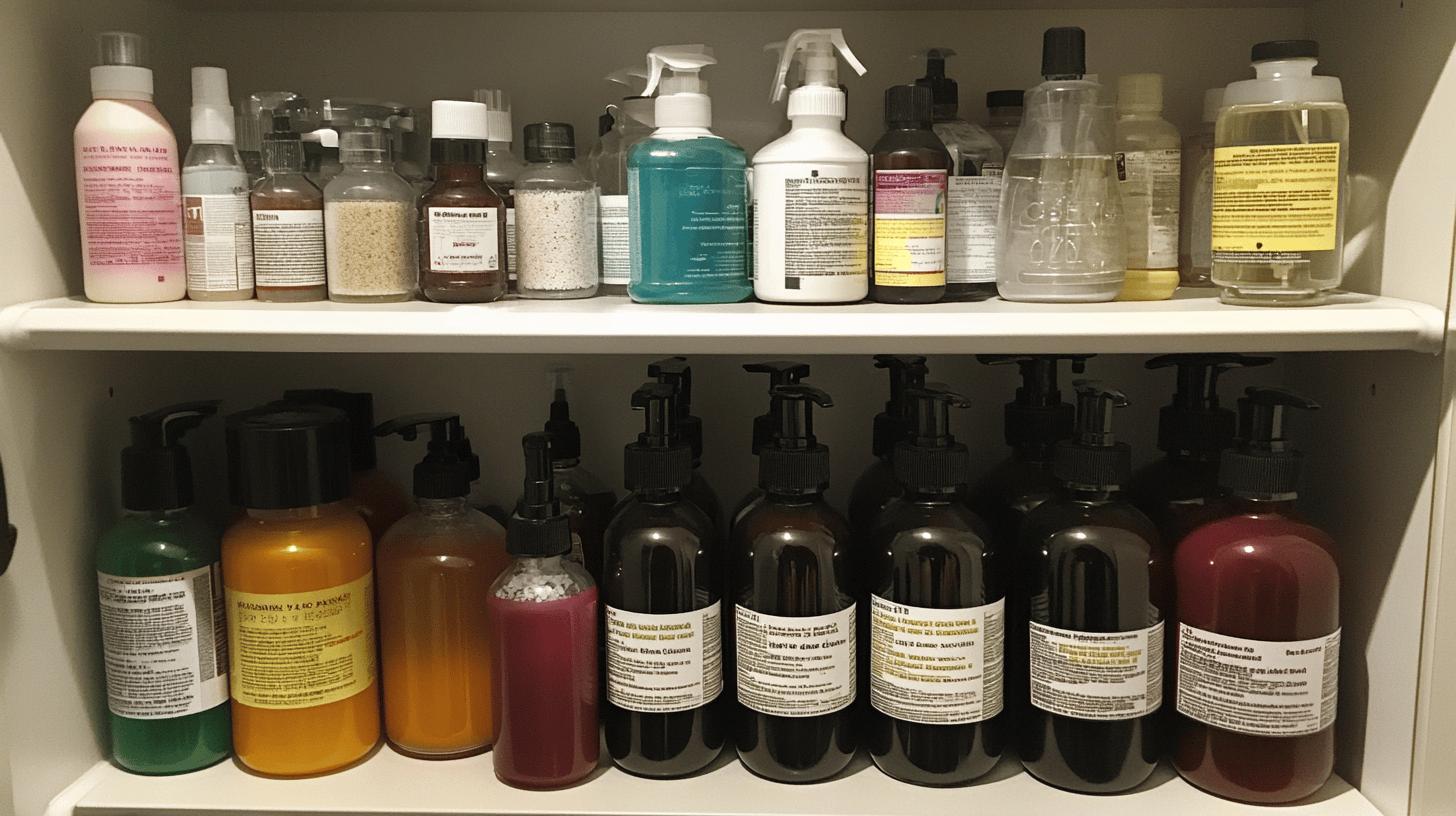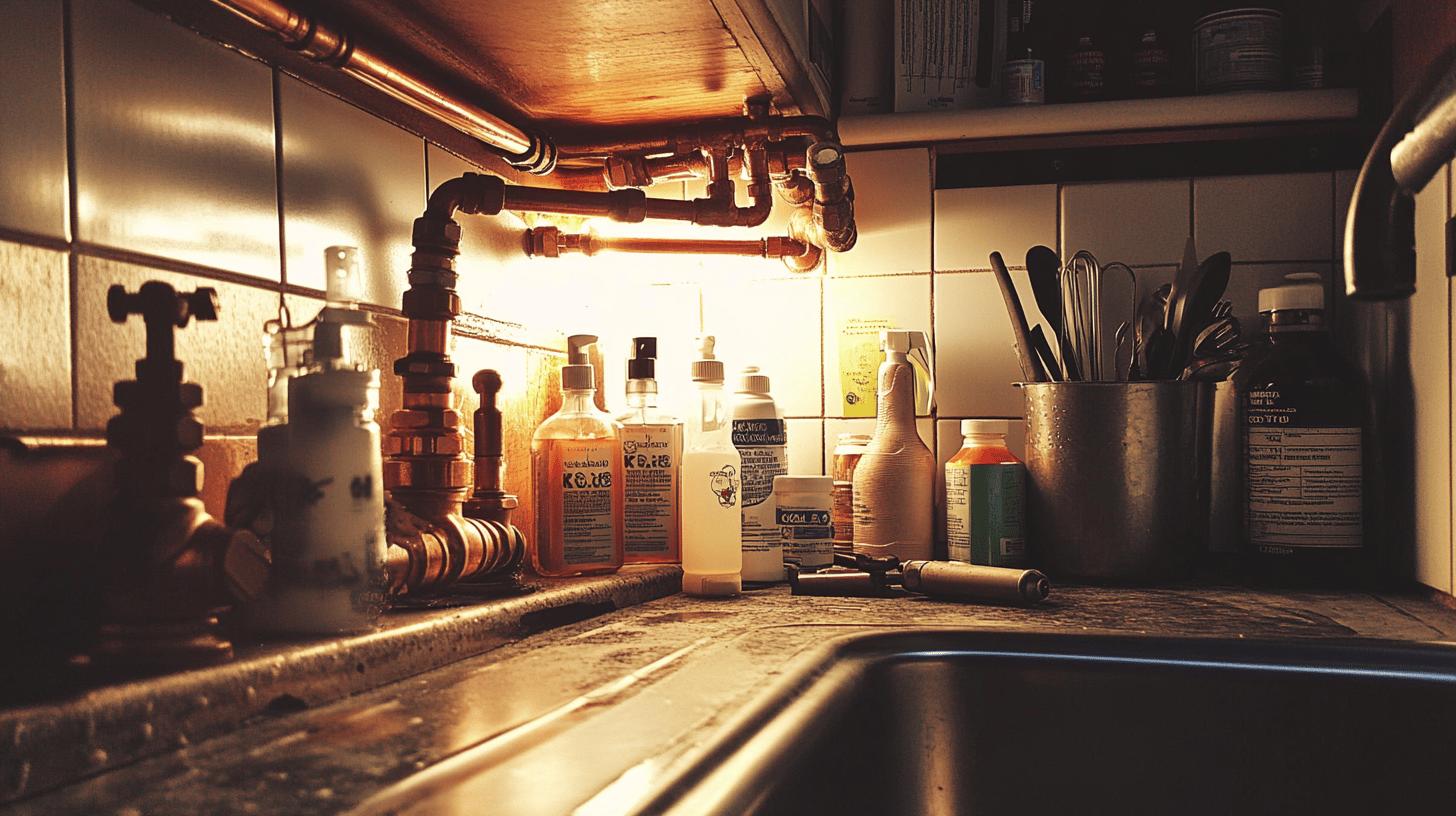TL;DR:
- Effectiveness: Chemical drain cleaners dissolve hair clogs using strong compounds.
- Brands:
- Drano: Moderately effective on hair
- Liquid Plumber: Good on hair, less on grease
- Clean Out: Very effective
- Green Gobbler: Less effective
- Types:
- Alkaline cleaners: Good for hair, risk of corrosion
- Acid-based cleaners: Strong, can damage plumbing
- Enzymatic: Safe, slow hair degradation
- Alternatives: Baking soda + vinegar, plumbing snakes, plungers, boiling water.
- Safety: Chemical cleaners can harm copper/brass pipes and the environment; use responsibly.
- Professional Services: Effective and reliable for stubborn clogs; include hydro jetting and rooter service.
When faced with a stubborn hair clog that won’t budge, you might consider reaching for a drain cleaner. Many chemical drain cleaners claim to dissolve hair, but their effectiveness and potential risks deserve a closer look. Understanding how alkaline or acid-based chemicals break down hair clogs is key to knowing whether these cleaners are a quick fix or a risk to your plumbing.
In this article, we’ll break down the mechanics behind these products and compare popular brands. We’ll also discuss the safety precautions necessary to protect your pipes from long-term damage. Whether a drain cleaner is the right solution for your hair clog, or if safer alternatives would be more effective, we’ll help you figure it out.
Understanding the Effectiveness of Drain Cleaners on Hair
Yes, drain cleaners can dissolve hair clogs, but their effectiveness depends on the type of cleaner used. Alkaline cleaners, like those containing sodium hydroxide (lye), react with hair and other organic material to break them down into soluble compounds, making it easier for the clog to be flushed away. Acid-based cleaners, which contain substances like hydrochloric or sulfuric acid, are primarily designed to break down grease but can also help dissolve hair.
However, while these cleaners can be effective in dissolving hair, they might not work as well on more stubborn clogs or those deep in the pipes. Additionally, repeated use of harsh chemicals can damage pipes, especially older or plastic ones, and pose safety risks. Therefore, it’s important to assess whether a drain cleaner is the best solution or if mechanical methods, like plunging or using a drain snake, would be more effective and safer.
Here’s how some popular brands perform on hair clogs:
- Drano: Works moderately well, better on grease, leaves some hair behind.
- Liquid Plumber: Good for some hair, less effective on grease.
- Clean Out: Very effective, quickly dissolves clogs into liquid.
- Green Gobbler: Less effective in dissolving hair.
Chemical drain cleaners can indeed be effective, but they come with risks. Frequent use of these cleaners can cause corrosion, especially in older pipes like copper or brass. The chemicals, such as sodium hydroxide or sulfuric acid, can weaken pipes over time, potentially leading to leaks or even pipe failure.
In addition to the damage they can cause to plumbing, these cleaners also pose safety concerns. Proper precautions, like wearing gloves and ensuring good ventilation, are essential to avoid chemical burns or inhaling harmful fumes. Beyond the immediate risks, it’s important to consider the long-term environmental impact of these harsh chemicals, which can contaminate water sources when flushed down the drain.
For these reasons, it’s often better to explore alternatives, like mechanical tools (plungers or drain snakes), or natural remedies (like baking soda and vinegar), to address clogs without compromising your plumbing or safety.
Comparing Drain Cleaner Types for Hair Dissolution

To get rid of hair clogs, there are different types of drain cleaners, each working in its own way. Chemical cleaners come in alkaline and acid-based versions, but there are also natural enzymatic cleaners and plumbing snakes that can do the job.
Alkaline cleaners, like those with sodium hydroxide or lye, break down hair by reacting with it. They work well, but using them too much can wear out older pipes.
Acid-based cleaners use strong acids like hydrochloric or sulfuric acid. They’re great for grease and hair but can damage your pipes if you use them often. Always wear gloves and keep the area ventilated when using them.
Enzymatic cleaners are a gentler choice. They use natural bacteria or enzymes to break down hair over time. They’re safer for your pipes and the environment but take longer to work, making them great for regular upkeep.
| Type | Effectiveness | Safety |
|—————–|——————————–|——————————-|
| Alkaline-Based | Great for hair, organic matter | Risk of pipe corrosion |
| Acid-Based | Strong for grease, fair for hair | Could damage plumbing |
| Enzymatic | Slow hair digestion | Environment-friendly and safe |
The best option depends on what you need. Alkaline and acid-based cleaners work fast, but they can damage pipes if used too much. Enzymatic cleaners are safer, but they take longer to work. If you want to avoid chemicals, a plumbing snake is a good choice and can do the job without the risks.
Alternatives to Chemical Drain Cleaners for Hair Clogs
Yes, homemade drain cleaners like baking soda and vinegar can help dissolve hair. Just pour a cup of each down the drain, let them fizz for a few minutes, and then flush with boiling water. The fizzing reaction helps break down the hair and other debris in the drain. It’s a simple and natural solution!
- Plumbing Snake: Manually break and remove hair clogs.
- Plunger: Use suction to dislodge and remove hair.
- Boiling Water: Pour to dissolve hair and debris causing blockages.
Natural and physical methods are great for your plumbing because they avoid the risks of corrosion and are better for the environment. These methods keep your drains clean while protecting both your pipes and your health.
Safety and Environmental Concerns of Using Drain Cleaners

Chemical drain cleaners aren’t safe for all pipes. They can damage copper and brass pipes over time by causing corrosion, leading to leaks. PVC pipes are more resistant, but frequent use still carries risks for your plumbing system in the long run.
These cleaners also pose environmental hazards. Harsh chemicals can contaminate water sources and harm aquatic life if not disposed of properly. Plus, the fumes can affect indoor air quality, impacting human and pet health. It’s essential to use them responsibly and dispose of them properly to minimize environmental impact.
Enzymatic cleaners are a safer alternative. They use natural enzymes or bacteria to break down hair gradually, which is gentler on your pipes. While they’re slower, they produce fewer fumes and are safer to handle. Always follow the manufacturer’s instructions, use protective gear, and ensure proper ventilation when using any type of drain cleaner.
Professional Solutions for Drain Maintenance and Hair Clogs
Yes, professional services are very effective for hair clogs. They use specialized tools like drain cameras and hydro jetting to break down and clear clogs thoroughly. These experts can handle not just hair, but also soap scum, grease, and other blockages, ensuring your drains stay clear longer and reducing the chances of future issues.
- Hydro Jetting: High-pressure water clears clogs, including hair, without damaging pipes.
- Video Inspection: Helps locate and assess clogs for targeted cleaning.
- Rooter Service: Uses tools to remove deep clogs and restore drainage.
Customers typically appreciate professional drain cleaning services for their prompt and efficient response, especially in emergencies. Many praise the skilled technicians for using advanced techniques and providing thorough, long-lasting solutions. The reassurance that their plumbing issues are being handled by experts brings peace of mind, leaving customers satisfied with the overall service.
Final Words
Exploring drain cleaners shows how different chemicals work on hair clogs, but also the potential risks to your pipes and the environment. Alkaline and acid-based cleaners can dissolve hair effectively, but they can damage pipes over time. Brands like Drano and Liquid Plumber vary in their ability to tackle hair clogs.
For a safer, eco-friendly approach, natural remedies like baking soda and vinegar, as well as mechanical methods, are great options. When DIY methods don’t cut it, professional drain cleaning services offer a thorough solution. Understanding how different cleaners dissolve hair helps ensure you make the best choice for your plumbing system.
FAQ
Will drain cleaner dissolve hair overnight?
Chemical drain cleaners, especially those containing sodium hydroxide or lye, can dissolve hair overnight, but effectiveness varies. Hair clogs may need repeated treatment depending on severity and cleaner strength.
Will drain cleaner dissolve hair in the shower?
Drain cleaners with strong alkaline or acidic components can dissolve hair in shower drains. Consider the type and severity of the clog before selecting a product, as some cleaners may be more effective than others.
How long will it take for drain cleaner to dissolve hair?
Hair dissolution can occur within hours, but some clogs require overnight treatment. The duration often depends on clog size and cleaner potency.
What is the best drain cleaner for hair?
Effective hair-dissolving drain cleaners include Drano Hair Buster Gel, Liquid-Plumr Hair Eliminator, and Instant Power Hair & Grease Drain Opener. These products target hair clogs specifically and are well-reviewed.
How do you dissolve hair in a shower drain?
To dissolve hair in a shower drain, use an appropriate chemical drain cleaner, follow product instructions for application, and consider repeating if the clog persists for severe obstructions.
Does Drano break down hair?
Drano products, particularly those formulated for hair clogs, break down hair effectively. The formula disintegrates organic matter like hair, though several applications might be necessary for tough clogs.
Which chemical can dissolve hair?
Alkaline chemicals like sodium hydroxide (lye) and acidic options such as sulfuric acid are effective at dissolving hair. These are commonly found in many commercial drain cleaners.
How do you unclog a drain full of hair?
Unclog a hair-filled drain using a drain cleaner, plumbing snake, or a mix of baking soda and vinegar. When combined with hot water, these methods help break down and remove the clog.
Are Liquid-Plumr and Drano effective for hair clogs?
Liquid-Plumr and Drano are effective against hair clogs. They contain powerful formulas designed for hair, delivering reliable results with proper use, although some clogs may require repeated treatments.
Are enzymatic drain cleaners effective for hair clogs?
Enzymatic drain cleaners work gradually by digesting hair and other organic materials. While not as fast as chemical cleaners, they are safer for both plumbing and the environment.

